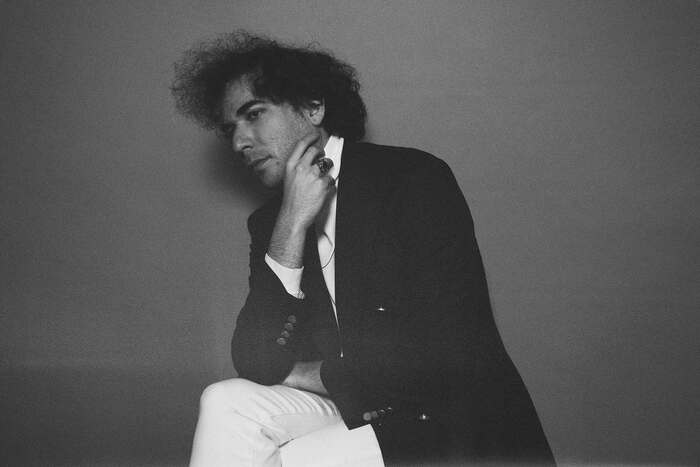Purveyors of: instrumental guitar rock
File next to: Django Reinhart, Biréli Lagrène, Les Paul, and your favourite surf compilation.
Playing: Wavelength Summer Music & Arts Festival, Sunday, August 18th at Stackt — 28 Bathurst St. Get tickets here!
2016, Guelph, Ontario, Kazoo! Fest, and a boxing ring. The air was sweaty, and the primary lights were focussing on two musicians: a non-stop drummer and a guitarist with three amplifiers and a Les Paul. Every note plucked, struck, and held brought the space into a shared sonic presence. It was meditative and electric. This is Yonatan Gat.
His current release, Universalists, was co-produced with the late David Berman (Silver Jews, Purple Mountains). This album blends live performance collaborations with the Eastern Medicine Singers, samples from many corners (I think there’s a brief gamelan somewhere), and Yeezus editing that places past sounds with present instrumental interpretations. It’s cool, man.
Wavelength’s Emmalia Bortolon-Vettor had a chance to ask Yonatan Gat about guitar playing, improvisation, and composition.
Could you tell us a little bit about your multi-amplifier blending technique? Do you always use Fender Amplifiers?
Yeah I love those spring reverbs and the way they distort. In the past, for the shock factor, I would keep an amp off and turn it on at certain parts of the concert, but I’m not that interested in shocking people in an immediate way anymore. I want the whole thing to just be shocking, slowly and calmly shocking.
Do you have any specific warm-ups with scales or patterns before diving into a playing session?
I used to warm up before shows but I find that my role in my own music is becoming less and less physical over the years. When you’re a kid, it’s all about the body. Then it’s about technique. Later you find out there’s other stuff too.
I noticed at your Hillside Festival performance that you used a piano-based sustain pedal. Aside from electrical manipulation, how has this pedal been altered for your sonic needs?
It’s the only pedal I use. I always liked sustain, reverb. Something that keeps the sound going for longer. It might have something to do with fearing death.
You elegantly blend chromaticism into your improvisation. How do you approach this?
Thank you. When it comes to scales, they each have their feel, their colour, sometimes even a geographic feeling. I try to use the ones I feel connected to to make the music richer.
Do you use any alternate tunings?
What I like about alternate tunings is that you put your finger somewhere and you don’t know how it’s going to sound. In a way it’s like playing stoned. I used the Velvet Underground’s “ostrich guitar” tuning (all strings tuned the same) for the track “Chronology.” I use an open D when the song calls for it, but most of the time, although I like the mystique, I don’t spend a lot of time thinking about technical stuff like alternate tunings. They are just one of many tools a player can use when he imagines it.
How has your technique and approach to guitar playing changed from let’s say, 10 years ago? What have you learned?
I play more dynamic. I learned that a clean guitar can be more powerful than a distorted one. It’s a way of going back to the source and finding the power there.
In a previous interview with Judie Vegh, you had stated that composition happens all the time, in soundchecks, and our daily interactions and inner-voices. How does this approach to listening affect the way we improvise?
It’s an interesting question. I guess I just try to keep my ears open. So many interesting sounds in the world. In nature, in the cities where we live. Our music needs to sound natural like that, like the world. Even if it’s all electronic ands fucked up, music is our contribution to the sound already going on in the world.
There is nothing more satisfying than a spiritual relationship with a musical instrument. How would you describe your relationship to the guitar?
I see the guitar as a tool. I play it because it’s the most useful one for what I’m trying to achieve. it enables me to communicate ideas clearly to the musicians I collaborate with. The music is done by everyone – drummers, synth players, singers. The guitar is a useful tool for me to guide the music. The more people on stage, the less I have to concentrate on playing and the more on communicating.
Last but not least, what are you currently listening to?
My friend David Berman recently passed away. He started a band called Silver Jews in the late ‘80s and became a legendary poet and songwriter. [Berman’s final album was released earlier in 2019 under the name Purple Mountains.] It’s not that I listen to his music so much since he died, but I constantly hear his songs in my head now. I’ve been realizing that his words really set him apart from the other slacker musicians that aged poorly and I’ve grown tired of. There is nothing slackery about the seriousness with which he crafted his words. He suffered for it, like we all need to, but he suffered more. In my childhood, I wanted to be a songwriter like him, but I found out later I was something else, and I was lucky to have [him] in my life to help me keep discovering who I was. I’ll always miss him.

